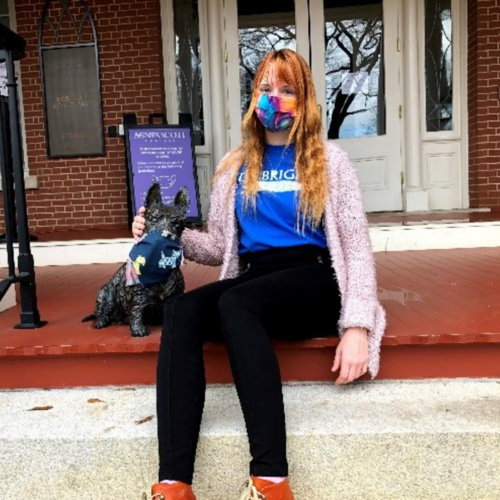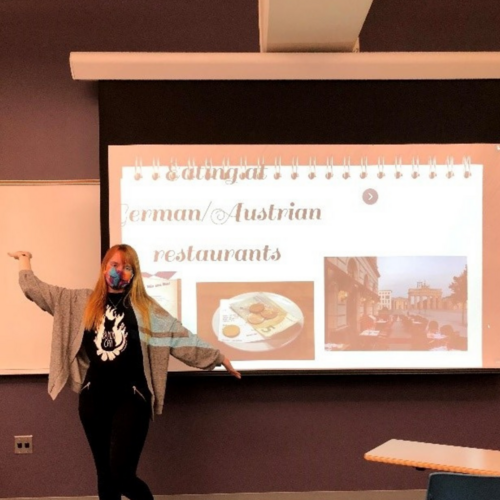My year at Agnes Scott College did not start out the way I had planned. In July 2020, it was announced that the fall semester at ASC would be 100% virtual, which meant that I would not be allowed to enter the United States. Therefore, I had to teach the first semester online from Austria. Looking back, I have to say that this wasn’t necessarily a bad thing because it allowed me to experience online teaching for the first time. I also believe that my students learned more about Austria than they would have if I had been there in person. We were all in different time zones, and the fact that I was still in Europe allowed me to share more cultural aspects with my students. Some of them had never even heard of Austria, and now they got to work with someone who was actually in that country during classes. Over the course of the fall semester, I recorded many videos about different aspects of life in Austria, posted pictures on the ASC German Instagram account, and organized events related to Austrian and German culture. My students were really interested in my life and asked me a lot of questions. Teaching from my old room in my parents’ house wasn’t always easy, and some lessons were interrupted by family members bursting into my room, but, overall, it was a good experience.
An FLTA's experience in the pandemic: teaching online and in person
5 July 2021The 2020–21 program year was unique in many ways. For FLTA Helene Knabl, pandemic-related measures resulted in a hybrid Fulbright experience that saw her teaching online and in person.
Helene Knabl: My experiences at Agnes Scott College in 2020–21
In January 2021, I was finally able to fly to Atlanta and move into the TA apartment on campus. Most German-language students chose virtual instruction for the spring semester as well, but I still got to meet many of them on campus. I conducted most of my spring semester classes online, but once a week I taught a class in person. By January, we had all gotten used to the virtual classroom setting, so I was fine with teaching online for the rest of the school year. Teaching online didn’t stop me from getting to know my students, and I even had fun trying to figure out from which café or room in their house my students were joining the Zoom sessions. One time, a student joined my class while shopping for groceries at Walmart. At first, I found this quite rude, but it was also kind of funny.

Overall, I really enjoyed teaching at ASC, even if my classes were online. I think that everyone learned how to appreciate the small things more. For example, my students were super excited whenever they saw me on campus and immediately told my supervisor (“Today I met Helene while she was checking her mailbox!”). As more and more students on campus got vaccinated, the German Club was also able to organize some events in person. I organized an Austrian treat-tasting event and an Easter egg hunt on campus, and I loved seeing how my students were thrilled to meet each other in person again.

Even though the pandemic made things a lot harder, I was still able to experience everyday life in the United States and, once I got vaccinated, I visited many places, including Chicago, Philadelphia, Boston, Virginia, Alabama, and Miami. Of course, I would have preferred to spend a “normal” school year at Agnes Scott, but now I feel like I have a special bond with my students, and I got to visit some of them in their hometowns after the end of the spring semester, which was also an amazing experience. I am thankful that I was able to experience both teaching online from my Austrian hometown as well as teaching in the United States. I learned to adapt to new situations and the importance of always looking on the bright side, and I will forever be grateful for this opportunity!
Helene’s experience was truly unique given that the FLTA program requires participants to physically be in the US—her experience was only possible due to a variety of factors related to the COVID-19 pandemic. We are glad that she was able to have such a unique experience, and we look forward to the upcoming program year, when all FLTAs will once again spend the entire academic year on their respective host campus.